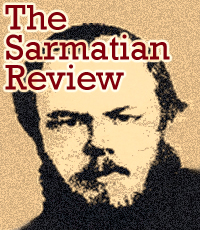| This Issue | Back Issues | Editorial Board | Contact Information |

A note on Wisława Szymborska’s “The Tarsier" (“Tarsjusz”)
Reviewer: Ela Rossmiller
The tarsier, or tarsus, is a squirrellike nocturnal animal of the East Indies and the Philippines, with large, goggle eyes. It lives in trees and feeds on insects. “The Tarsier” is typical of Wisława Szymborska’s poetry. The language is whimsical, the imagery uses animals to say something about life, and the meaning is complex and nuanced. Like most of Szymborska’s poetry, “The Tarsier”can be read on many levels, depending on the tone of voice with which it is read.
For example, in what tone of voice do you read: “My coat’s too small for a fur collar,/My glands provide no bliss,/And concerts go on without my gut”? Is the tarsier merely being meek, or is the tarsier expressing anger at the ironic observation that the only reason he is alive is because his death would not have served someone else’s purposes?
Similarly, the lines “My good lord is gracious, my good lord is kind” could be read either in a sincere tone of voice, or a sarcastic one. I hear sarcasm, because later it says “But what you’ve come to know about yourselves will serve for a sleepless night from star to star.” The “lord” is neither gracious nor kind, but guilty of some crime.
The tarsier’s death would not be profitable to the master, and so it is permitted to live. Even so, the master finds a way to exploit the creature, and sells it “for the poses I strike to make you smile.” That he has permitted the tarsier to live, albeit as a plaything, allows the master to believe in his own mercy and goodness, thereby easing his guilty conscience.
The stanza which follows draws out the point. It could be paraphrased, “We few who have not been skinned, mutilated, or plucked, are your dream, which finds you innocent of murder for now, but only for so long as we are alive. Should we die, our death would proclaim your guilt.”
The relationship between the tarsier and the master is perhaps captured by the Romanian proverb expressing the relationship of the weak to the strong: “Kiss the hand you cannot bite.” The weak may hate their oppressors, yet treat them with obsequious gentility because of their relative weakness in the face of such powerful domination. The tarsier, a frail creature, adopts whimsical, graceful, and clever speech to launch a cloaked accusation while avoiding a direct confrontation.
And what does the tarsier say about itself? First, it takes comfort in the fact that tarsiers have existed for generations and will continue to exist. The tarsier will endure, as tarsiers have always endured. Second, the tarsier is certain of its own dignity, despite its apparent insignificance. Finally, the tarsier is ineffably self-possessed, sure of its purpose in the world: “I, a tarsier, know well how essential it is to be a tarsier.” I would speculate that the tarsier’s essential character is to be a symbol to the world revealing the infinite significance of the most insignificant of creatures.
The interpretation of the poem depends on who you think the tarsier and the master symbolize. It is certainly possible that the tarsier represents no other being than itself, that the master represents the human race, and that the poem is about the unjust exploitation of animals.
It is also possible that the tarsier represents humanity, that the “lord and master” represents God, and that the poem is about our unjust treatment at the hands of a cruel deity.
Or the master is a political demagogue responsible for the death of millions of people who were, in actuality, treated as animals. In this case, it would make sense for Szymborska to employ a language so beautiful, and images so rich, that this meaning would not be apparent at first glance. Given that the poem was published in 1967, such intentional indirectness would be necessary to get by the censors.
But do we really need to travel across the Atlantic and back in time to find people and situations to whom and to which the poem can apply? The themes are universal: the humility, dignity, and endurance of the weak; the domination, arrogance, and deceit of the strong; and the beauty, frailty, and stubborn persistence of life. ∆
“Tarsier” can be found in Nothing Twice/Nic dwa razy, a bilingual selection of Szymborska’s poetry translated by Stanisław Barańczak and Clare Cavanagh (Kraków: Wydawnictwo Literackie, 1997).
Back to the April 2005 Issue
The Sarmatian Review
sarmatia@rice.edu
Last updated 5/25/05